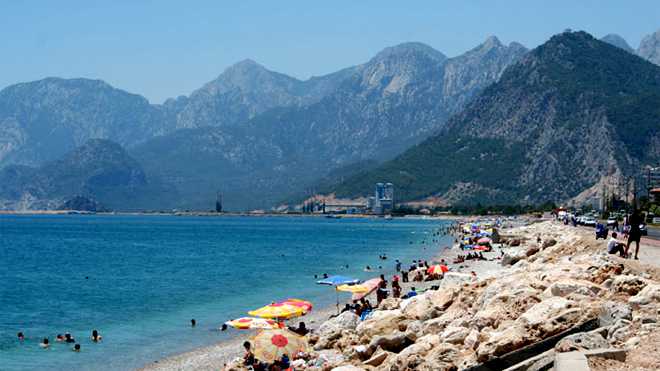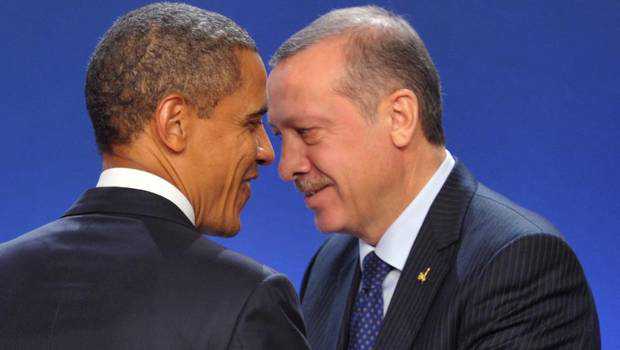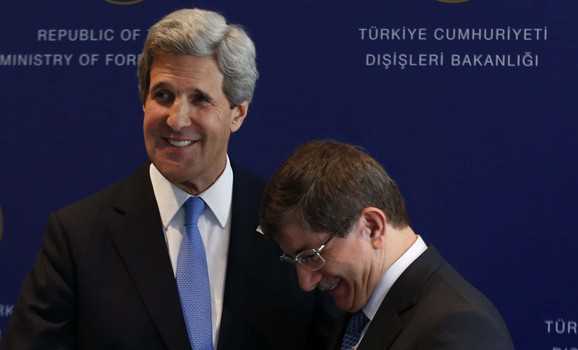By James D. Zirin
A supporter of world-renowned Turkish pianist Fazil Say holds a cardboard reading ‘Fazil Say is not alone’ during protest held outside an Istanbul court (Image credit: AFP/Getty Images via @daylife)
Turkey’s Prime Minister Tayyip Erdogan will travel to Washington May 16 to meet with President Obama, largely to discuss his country’s relationship with the US and the European community, and most probably Erdogan’s on-again off-again relationship with Israel. Undoubtedly, a strong US alliance with Turkey, with its vibrant economy and geo-political position, is of tremendous strategic importance to the United States. In the run-up to the meeting, however, Obama might well consider Turkey’s human rights record, particularly how many nations are left on this planet where someone could go to jail over a Twitter post? North Korea, Iran, China? Maybe. But Turkey is the latest to win that dubious distinction.
Fazil Say, 42 years-old, is an internationally recognized Turkish pianist and composer, who has performed with major orchestras throughout the world, including the New York Philharmonic and the Berlin Symphony. His personal style of composition, rooted in the folk music of Turkey, evokes Bartók: a fantasia-like basic structure; and a variable dance-like rhythm.
An Istanbul court convicted Say of inciting hatred, insulting Islam and offending Muslims on Twitter. Although not sentenced to jail, he is on probation for five years on condition that he not re-offend Muslims, even if he is just re-tweeting what someone else said. Say could have been sentenced to 18 months in prison. The case renewed brewing concerns about the influence of religion on Turkish politics.
Say’s “crime” was a series of tweets posted earlier last year. In one message he retweeted a verse from a poem by Omar Khayyám in which the 11th-century Persian poet attacks pious hypocrisy: “You say rivers of wine flow in heaven, is heaven a tavern to you? You say two huris [companions] await each believer there, is heaven a brothel to you?” In other tweets, he made fun of a muezzin (a caller to prayer), implying that the particular muezzin’s call lasted only 22 seconds because he wanted to go out for a drink. Another retweet by Mr. Say posits: “I am not sure if you have also realized it, but if there’s a louse, a non-entity, a lowlife, a thief or a fool, it’s always an Allah-ist.” Bad taste, maybe, in a country where Muslims comprise roughly 98% of the population, but hardly a crime?
Turkey is not a particularly safe place for artists and intellectuals, or women for that matter, who may wish to criticize Erdogan’s government. In 2007, a journalist Hrant Dink, who had written about the Armenian genocide of 1915, was shot dead on an Istanbul street. A judge last year fined Orhan Pamuk, the Nobel laureate writer, $3,700 for saying in a Swiss newspaper that Turks “have killed 30,000 Kurds and 1 million Armenians.”
Pointing to the Say and Pamuk cases, as well as the prosecution of numerous journalists, artists and intellectuals for voicing their views, critics have accused the governing AK Party of undermining the secular values of Turkey’s founder Kemal Ataturk, and pandering to Islamists, who have recently asserted themselves with renewed intensity. Say himself claimed that his prosecution was politically motivated. An atheist, Say had often criticized the Islamist-rooted party, accusing it of having a secret agenda to promote conservative values.
The European Union, which Turkey seeks to join, admonished Erdogan about the Say conviction. A spokeswoman for EU foreign policy chief Catherine Ashton said Brussels was “concerned” by the prosecution, which “underlines the importance for Turkey to fully respect freedom of expression.” Amnesty International said in a report last month that “freedom of expression is under attack in Turkey,” calling for legislative reforms to bring “abuses to an end.”
Dozens of journalists are in detention in Turkey, as well as lawyers, politicians and lawmakers – most of them accused of plotting against the government or having links with the outlawed Kurdish rebel movement the Kurdistan Workers’ Party (PKK). Meanwhile, Erdogan continues with his sultanic project to build at state expense over the Bosporus the largest mosque in Turkey, as Fazil Say calls his conviction “a sad day for Turkey.”
Madeleine Albright has said that foreign policy is getting other countries to do what you want them to do. Obama should use the occasion of the Erdogan meeting to take heed of the clarion call of another British Prime Minister, Winston Churchill, who said in his “Iron Curtain” speech delivered in Fulton, Missouri March 5, 1946, “All this means … that freedom of speech and thought should reign; that courts of justice, independent of the executive, unbiased by any party, should administer laws which have received the broad assent of large majorities or are consecrated by time and custom. Here are the title deeds of freedom which should lie in every cottage home. Here is the message of the British and American peoples to mankind. Let us preach what we practice – let us practice what we preach.”
Turkey’s human rights record is execrable. When Obama meets Erdogan next month, he should preach a little of what we try to practice.
via Obama’s Talks With Turkey: Let Us Preach What We Practice – Forbes.





